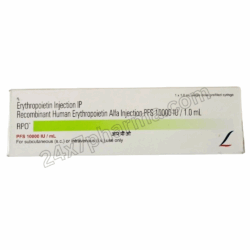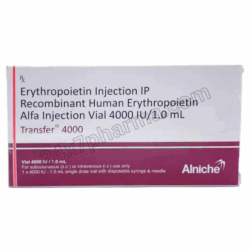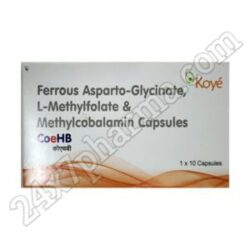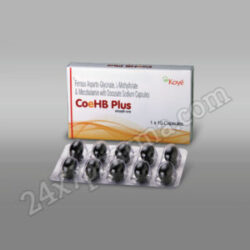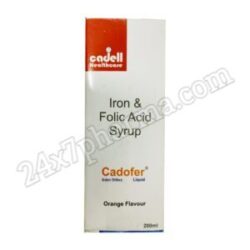Introduction to Transfer 2000 IU Injection
Transfer 2000 IU Injection, also known as erythropoietin injection, is a specialized medication used to treat anemia, particularly in patients suffering from chronic kidney disease (CKD), cancer-related anemia, or those undergoing chemotherapy or dialysis. This injection contains erythropoietin 2000 IU, a synthetic version of the natural hormone erythropoietin, which plays a critical role in stimulating red blood cell production in the bone marrow. By replenishing red blood cells, this treatment effectively combats fatigue, boosts energy levels, and improves the quality of life for patients with anemia.
If you or a loved one has been prescribed the Transfer 2000 IU Injection, understanding how it works, its uses, side effects, and necessary precautions is crucial. Below, we provide a comprehensive guide to help you make informed decisions about your treatment.
How Does Transfer 2000 IU Injection Work?
The active ingredient in Transfer 2000 IU Injection is erythropoietin, a naturally occurring glycoprotein hormone responsible for stimulating the bone marrow to produce red blood cells. In patients with anemia, the body may not produce enough erythropoietin due to underlying conditions like kidney failure or the side effects of chemotherapy.
When administered, erythropoietin 2000 IU injection binds to specific receptors in the bone marrow, triggering the production and maturation of red blood cells. This increase in red blood cells enhances oxygen delivery throughout the body, relieving symptoms of anemia such as fatigue, weakness, and shortness of breath. Transfer 2000 IU Injection thus restores balance to red blood cell production, improving overall health and vitality.
Uses of Transfer 2000 IU Injection
Transfer 2000 IU Injection is primarily prescribed for the treatment of anemia caused by:
- Chronic Kidney Disease (CKD): Patients with CKD often experience reduced erythropoietin production, leading to anemia. Erythropoietin 2000 IU injection is highly effective in managing this condition.
- Cancer or Chemotherapy: Cancer treatments like chemotherapy can suppress the bone marrow’s ability to produce red blood cells. Transfer 2000 IU Injection helps counteract this side effect.
- Dialysis-Related Anemia: Dialysis patients frequently lose red blood cells, making erythropoietin injections an essential part of their treatment regimen.
- Surgery or Blood Loss: In certain cases, Transfer 2000 IU may be used to reduce the need for blood transfusions in patients undergoing surgery or experiencing severe blood loss.
By stimulating red blood cell production, erythropoietin 2000 IU injection provides significant relief from anemia-related symptoms, allowing patients to regain energy and maintain an active lifestyle.
Other Dosages
For other dosages or high Strength, please consult your healthcare provider to determine the appropriate treatment plan based on your specific medical condition and requirements. Always follow your doctor’s guidance for safe and effective use.
Side Effects of Transfer 2000 IU Injection
While Transfer 2000 IU Injection is generally well-tolerated, like any medication, it can cause side effects in some individuals. Common side effects include:
- Headache: Some patients may experience mild to moderate headaches after the injection.
- High Blood Pressure: Erythropoietin injections can occasionally raise blood pressure, so monitoring is essential.
- Nausea or Vomiting: These symptoms may occur but are usually temporary.
- Blood Clots: In rare cases, erythropoietin 2000 IU injection can increase the risk of blood clots, particularly in patients with pre-existing cardiovascular conditions.
It is important to discuss any side effects with your healthcare provider and report severe symptoms immediately.
Warnings and Precautions
Before using Transfer 2000 IU Injection, certain precautions must be taken to ensure safe and effective treatment.
- Medical History: Inform your doctor about any pre-existing medical conditions, especially high blood pressure, heart disease, or a history of blood clots.
- Allergies: Notify your healthcare provider if you have a known allergy to erythropoietin or any component of the injection.
- Pregnancy and Breastfeeding: The use of erythropoietin 2000 injection during pregnancy or breastfeeding should only occur under strict medical supervision.
- Iron Levels: Adequate iron levels are essential for erythropoietin to work effectively. Your doctor may recommend iron supplements alongside theTransfer 2000 Injection.
- Monitoring: Regular blood tests are necessary to monitor hemoglobin levels and ensure that the treatment is working without causing complications.
Adhering to these precautions will help maximize the benefits of the erythropoietin 2000 IU injection while minimizing risks.
Frequently Asked Questions
Q1. Can I use erythropoietin 2000 IU injection at home?
Answer: In some cases, your doctor may train you to self-administer the injection at home. Always follow medical instructions carefully.
Q2. Are there any dietary restrictions while using TRANSFER 2000 injection?
Answer: While no specific dietary restrictions apply, maintaining adequate iron levels through diet or supplements is crucial for the effectiveness of erythropoietin injection.
Q3. Can I stop the treatment once I feel better?
Answer: No, do not stop the treatment without consulting your doctor. Discontinuing erythropoietin 2000 IU injection abruptly can lead to a recurrence of anemia.
Q4. What should I do if I miss a dose?
Answer: If you miss a dose, contact your doctor immediately for guidance. Do not double up on doses to compensate.


